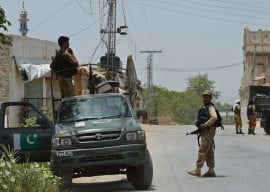
In a cosy gathering of families, youngsters and foreigners, a folk dance troupe from Landi Kotal gave a splendid performance of traditional Pakhtun dances at Kuch Khaas on Sunday.
Travelling all the way from the Federally Administered Tribal Areas (Fata), the troupe from The Institute for the Preservation of Arts and Culture (IPAC) performed tribal Bhittani-style dances such as Attan to the tunes of an assortment of instruments including the dhol, 18-string rubabs, surnai and toola (wooden flutes).
With each performer following the other, they followed the beat in circular movements. As the beat of the music picked up the dancers whirled faster and faster, much like dervishes, with their arms in the air holding colourful handkerchiefs.
The dancers put up an enthusiastic performance while the audience clapped and cheered them on. Soon, enthusiastic audience members joined in on the fun, with many hitting the floor to show off their dancing skills.
“It was a lovely performance, although I think I may not have matched their steps correctly,” commented a guest from Canada after dancing with the troupe. A cheerful spectator said, “The Pakhtuns have shown the Islamabad people how [the Attan dance] is done.”
It was evident that the audience were not the only ones enthusiastic about the performances, as the dancers themselves seemed ecstatic to showcase their skills, performing with great gusto and interacting with the audience.
Some dancers readily guided audience members who got up to participate.
The technique behind the Attan dance-which traces its origins to Afghan Pakhtun tribes-has changed much over centuries, but its base remains intact.
The circular dance can include two to over a hundred performers, said one of the dancers.
The event organiser, IPAC member Omair Jaffer, said IPAC is not only aiming to promote and preserve Pakhtun culture and create cultural awareness amongst the youth, but also aids in the promotion of these cultural performers. He said the revenue generated from the event will go to the welfare of the artists and performers. “Our focus is also to help struggling artists who have been fighting the war against extremism,” he added.
Published in The Express Tribune, November 21st, 2011.































1714024018-0/ModiLara-(1)1714024018-0-270x192.webp)









COMMENTS
Comments are moderated and generally will be posted if they are on-topic and not abusive.
For more information, please see our Comments FAQ